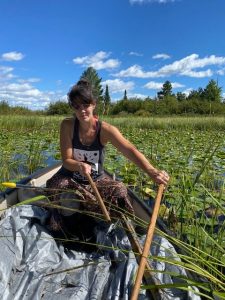By Mike Splaine, Splaine Consulting
June 1, 2021
Featuring:

Erin Long, Administration for Community Living (ACL) Office of Supportive and Caregiver Services
Amber Hoon, Tribal Dementia Program Director at Great Lakes Inter-Tribal Council
Part of the reality in Indian Country is that public health approaches to address Alzheimer’s and dementia aren’t always provided by traditional public health entities. One recent example is the Administration for Community Living (ACL) Alzheimer Disease Program Initiative (ADPI) which late last year funded four tribal entities to “provide information and tools to help older adults with dementia and their caregivers anticipate and respond to ties to challenges that typically arise during the course of dementia.” This, one of eight strategies identified in the Road Map for Indian Country (p. 21.).
Tribal ADPI grants awarded in 2020 include:
- Absentee Shawnee Tribe Of Oklahoma (OK)
- Aleutian Pribilof Islands Association, Inc. (AK)
- Great Lakes Inter-Tribal Council (WI)
- Spirit Lake Tribe (ND)
New grantees are required to dedicate a portion of their funds to direct services. By year three, all grantees must devote 45% of grant funding toward direct service programming. Direct services include, but are not limited to, delivery of home and community-based dementia-specific evidence-based and evidence-informed interventions and dementia education and training programs. ACL’s technical assistance center offers a list of programs used in past projects. Additionally, ACL has issued a new funding announcement to support Dementia Capability in Indian Country and applications are due on July 19th.
According to Erin Long from ACL Office of Supportive and Caregiver Services, “A tribally tailored funding announcement made it somewhat easier for tribes with little previous in dementia issues to apply, and we have done the same with this year’s request for proposals.” The Dementia Capability in Indian Country program is intended to support federally recognized tribes, tribal organizations, or consortiums representing federally recognized tribes. Cooperative agreements are for three years for up to $750,000 plus grantees receive significant planning and technical assistance.
Amber Hoon is the Tribal Dementia Program Director at Great Lakes Inter-Tribal Council (GLITC) in Wisconsin, one of the four initial grantees. “We’re early into the work but can see there is a real need and great desire to support persons with dementia in the community, so the themes of this project are getting traction while we are making our work plan final.”

First grants were made seven months ago, and as with everything else, COVID -19 challenges slows progress. “Social isolation has really taken a toll on our Elders, including their thinking skills, which is a new added layer of worry.” She further commented, “when we shift education and support activities to computer-based/online, it comes with challenges of rural access to broadband and extra costs.”
Hoon’s project plan includes training, education, and support for five tribal dementia capability specialists (DCS) and other tribal aging service staff from six tribal partners. Activities include staff training on the Savvy Caregiver for Indian Country curriculum, adaptation of training resources for tribal DCS for cultural relevance, and an outreach and awareness campaign designed to reach a wide range of community agencies and partners. To learn more about the GLITC project, contact Hoon at [email protected].
